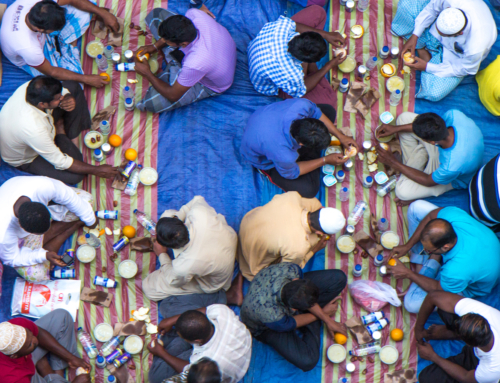By Saadia Z. Yunus
“When it rains, it really does pour,” she said aloud. “Why do horrible things happen to me?” It was just too easy to think this way, to look around and see that so many people had it better than her. She had lost her job and was finding it difficult to pay the bills. On top of it all, she had been feeling very sick and had no medical insurance to afford a doctor or medication. “Life is just too hard,” she said to herself. Tears streamed down her cheeks. But, just then, she received a text message from a friend. It read, “Call me when you get a chance. I’m going through something and need your amazing advice.”
She quickly wiped her tears, paused for a moment, and thought, “She needs advice from me? When I feel as if I have nothing to hold onto? Wow! Maybe I do have something to be thankful for after all.” It was just a simple reminder that helped brighten her perspective for the rest of the day. She smiled as she picked up the phone.
Learning Gratitude
Gratitude— a simple word with a dynamic power in its meaning and application. We often forget to cultivate and practice gratitude, overlooking how life-changing it can be. An attitude of gratitude has the ability to make a harsh reality seem tolerable, giving light to a gloomy disposition and dispelling negative attitudes, thoughts, and feelings with wondrous speed.
Research done by the University of California, Berkeley, has revealed that gratitude leads to a stronger immune system, healthier blood pressure, greater joy, optimism, and sense of overall well-being, acting with more generosity and compassion, and feeling less lonely and isolated (greatergood.berkeley.edu/expanding gratitude/). Participants in the study simply recorded five things they were grateful for each day. This small exercise proved to have enormous benefits. Imagine what a permanent attitude of gratitude can accomplish!
According to Islam, our ultimate gratitude is to God, our Creator and Sustainer who grants us existence and furnishes us with cognitive and emotional faculties, as well as the potential to understand and appreciate their value and benefit. “It is He who brought you forth from the wombs of your mothers when you knew nothing, and He gave you hearing and sight and intelligence and affection so that you may give thanks [to God]” (Quran, 16:78).
God, our Maker, has given us abundant opportunities, to live and thrive on this earth. From the greatest creative enterprise to the most basic regularity of our beating hearts — all is owed to Him first and foremost. If we forget the elemental requirement of thankfulness, then we are only doing a disservice to ourselves. If we do not feel gratitude to the Creator, how can we be thankful to anyone else? How can we appreciate the good things in our own selves and in our daily experience? (Did you know that one of the attributes of God is Ash-Shakur, the “Appreciative One”?)
Not only did God give us our very lives, He has provided a beautiful world for us to abide in, with countless resources for our use. God says in the Quran,
It is God who created the heavens and earth, who has sent down water from the sky and with it brought forth produce to nourish you; He has made ships useful to you, sailing the sea by His command, and the rivers too; He has made the sun and the moon useful to you, steady on their paths; He has made the night and day useful to you and given you some of everything you asked Him for. If you tried to count God’s favours you could never calculate them: man is truly unjust and ungrateful. (Quran, 14:32-34).
All that we have accomplished and all that we possess are due to God’s bountiful provision. We must recognize the powerful concept mentioned in the verse: that we would never be able to even count the blessings God has given us. After realizing that God’s blessings are fundamental to our existence and endless in their scope, who are we to be heedless and unthankful? That is nothing less than delusion of self-sufficiency.
Fruits of Gratitude
Thanking God for our blessings seem obvious, but what about thanking Him even in the midst of hardship? In the Quran, God reminds us: “You may dislike something although it is good for you, or like something although it is bad for you: God knows and you do not.” (Qur’an 2: 216).
Although a hardship seems far from “something which is good” when we are enduring it, the feeling of gratitude during the difficulty has the power to transform the burden, lighten the load, and provide a perspective that looks beyond the moment’s distress. The test will, thus, be easier to bear, and the negative effects of the difficult situation will be offset by our determination to stay balanced and remain open to valuable lessons and opportunities to augment our God-consciousness.
Yet another fruit of gratitude is the promise of additional blessings. “And [remember] when your Lord proclaimed, ‘If you are grateful, I will surely increase you [in favor]; but if you deny, indeed, My punishment is severe’ ” (Quran, 14:7). Being grateful to God will bring additional favors, while being ungrateful calls for God’s punishment. We will be asked about each and every gift that we have been given, as to whether or not we thanked God sufficiently. Will we be prepared with the right answer? (Learn more about The Concept of Gratitude in Islam.)
Cultivating Gratitude
- Let the remembrance of God guide you throughout the day.
- Write a list at the end of each day of five things to be grateful for; keep a gratitude journal.
- Practice thanking others for the simple things they do for you; write a thank you letter to someone who has impacted your life in a positive way.
- Remember the people who are less fortunate than you, step into their shoes, empathize with their plight, and do something, even if small, to alleviate someone else’s difficulty.
- When tough times set in, focus on the positives. Things could be much worse.
- Remind yourself often to adopt the attitude of gratitude and smile!
Adapted from an article published in Message Magazine.








